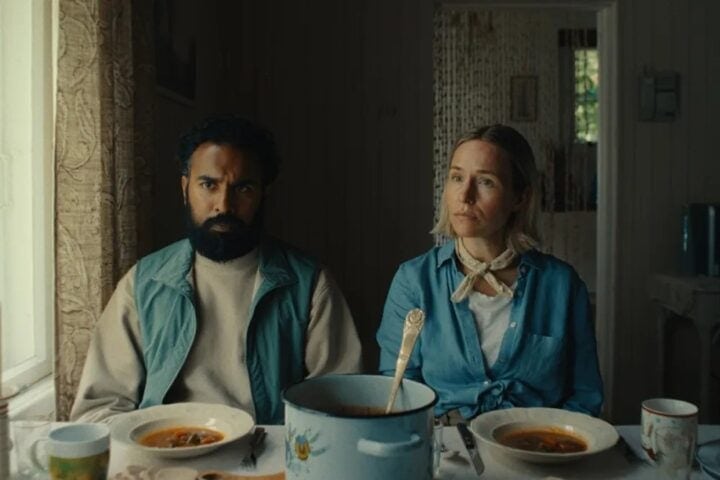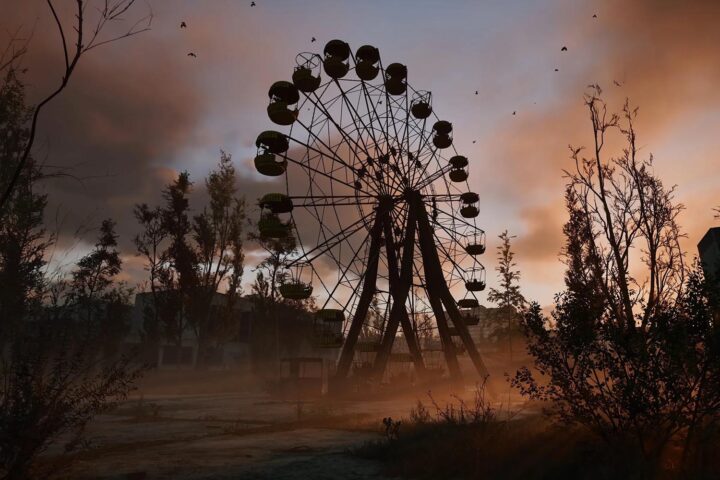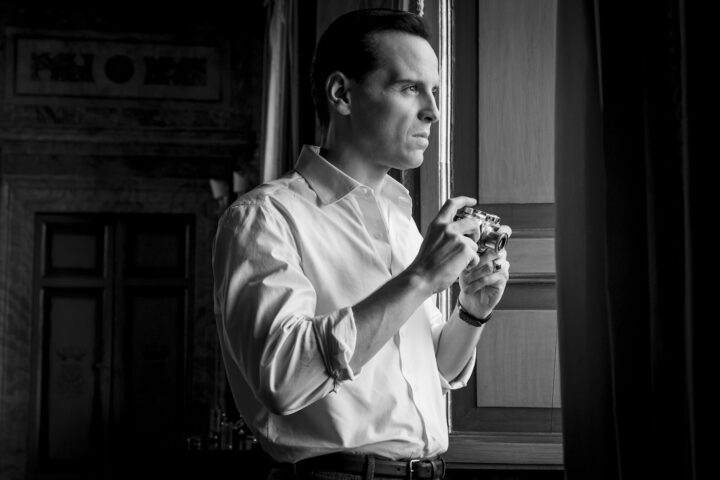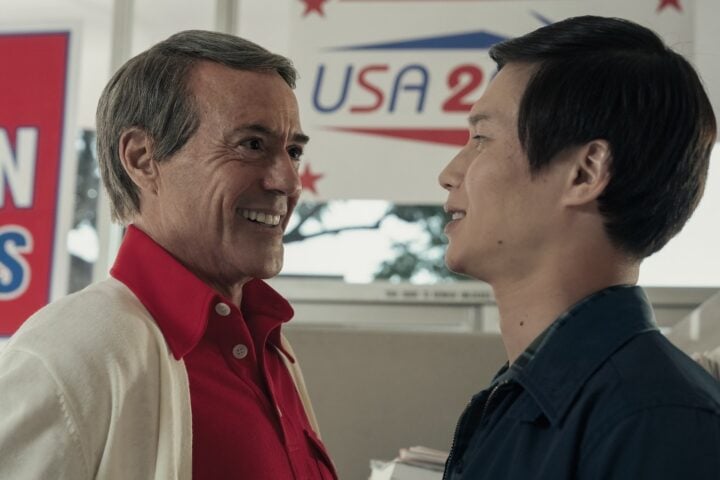A stark wooden cross stands in a moonlit cemetery in the opening episode of Fallout, Amazon’s eccentric and capacious adaptation of the video game series. From each arm hangs an IV bag that feeds a yellow liquid into a grave. There lies the body of Cooper Howard (Walton Goggins), an erstwhile cowboy who struck gold as a western film star before being blacklisted for alleged communist affiliations. Cooper lived in a distinctively retro-futurist United States. In this alternate universe, the 2070s were marked by escalating war between America and China and seemingly stuck in the 1950s, with black-and-white TVs and classic cars—plus robots that helped apron-clad homemakers around the house. Then the bombs fell, in a bout of mutually assured destruction that eradicated almost all life on Earth.
More than 200 years after the nuclear calamity, a trio of wary mercenaries dig up Cooper’s tomb and find a coffin chained shut. They loosen the shackles and wait. Out of the box springs, like a more self-awarely theatrical Nosferatu, the being that Cooper has become: the Ghoul (also played by Goggins), an infamous gunslinger whose exposure to the Great War’s radiation has cursed him to near-immortality in necrotic (and noseless) flesh.
Fallout depicts the wonders and horrors of the California wasteland—a thoroughly poisoned wilderness of mutated animals and makeshift communities—with a penetrating perspective and striking tonal nimbleness. It’s an absurdist, gruesome, and eclectically funny exploration of rampant corporatization, military industrialism, and life after the end times.
Once free, the Ghoul hunts a bounty that promises a never-work-again payout. The target: Wilzig (Michael Emerson), a renegade scientist who supposedly has the power to shape the wasteland’s future. Other factions want Wilzig for their own ends, like the Brotherhood of Steel, a technology-worshiping military order. The Brotherhood deploys an awkward squire named Maximus (Aaron Moten) and his petulant knight, Titus (Michael Rapaport), among others. (In his full-body, face-covering armor that thuds with each step, Titus suggests the Iron Giant if he were an asshole.) Meanwhile, a lone wanderer named Lucy MacLean (Ella Purnell) gets caught in the crossfire while searching for her missing father, Hank (Kyle MacLachlan), who’s been kidnapped by the enigmatic raider Lee Moldaver (Sarita Choudhury).
Fallout is a bizarro western through and through, from the frontier flair of the Ghoul’s hat and duster, to his delectably hammy one-liners, to the firefights that break out under the blazing desert sun. (The genre blend recalls Westworld, whose co-creators, Jonathan Nolan and Lisa Joy, executive-produced this series, with Nolan directing the first three episodes.) Some action sequences are difficult to parse or stiffly acted—and it may be too generous to read their stilted execution as a nod to the notoriously janky animations of the games.
For the most part, though, the Ghoul and his cohorts engage in giddily indulgent shootouts that one-up Isaac Newton: For every action, there’s an opposite reaction that’s not just equal, but bafflingly more violent. The second episode features a standout clash, presaged by Ramin Djawadi’s ominous score, that finds the Ghoul crashing into both Lucy and Maximus. After the Ghoul takes an unhurried beat to chomp on some cherry tomatoes amid the chaos, we trail a bullet soaring through the air in slow motion until it meets its mark in a combustive burst of blood and smoke. Bodies fly, heads explode, and video game logic reigns triumphant.
The ultraviolence of the wasteland is new to Lucy, whose quest to find her dad draws her away from home: Vault 33, one of the bunkers built and sold by the behemoth Vault-Tec company to spare the lucky few from the apocalypse. Lucy thus descends from a bloodline that could afford its own survival—and her odyssey, in turn, drives Fallout’s sharp excavation of the shattered American dream, as surface-dwellers deride her naïveté and introduce her to a truer meritocracy than the one that ruled the old world. (To her credit, Lucy adapts quickly thanks to her charming can-do attitude, which Purnell steers clear of cloying by infusing Lucy’s reliable “okey-dokey” with growing iciness.)
Back in Vault 33, Lucy’s brother, Norman (Moisés Arias), can barely stand his delusionally cheerful neighbors. The underground community remains frozen in the pre-war era, eating Jell-O, holding elections, and otherwise repeating the hollow rituals of American society until they deem the topside safe for repopulation. What begins as comedic relief—and initially scans as filler—gives way to surprisingly intriguing conspiracy, as Norman begins to investigate the history and purpose of Vault-Tec’s exclusive safe havens.
We learn more about the corporation in flashbacks to Cooper’s life before the nukes, namely through his relationship with his wife, Barb (Frances Turner), a Vault-Tec bigwig. The white-collar philosophizing of Bud Askins (Michael Esper), one of Barb’s colleagues, is particularly fantastic. “The future of all humanity comes down to one word: management,” he tells Cooper. In this and other exchanges, Goggins, a generational talent, softens Cooper’s suave machismo with a righteous but unpretentious humanistic streak. And in the present timeline, he allows the Ghoul to betray solemn glimpses into his former existence, as when he’s stunned by the sight of an ancient VHS of one of his movies, his eyes wide and mouth agape.
Among the show’s most notable achievements is the clarity and conviction with which it interrogates the myopic forces that are disintegrating our planet. In the face of the free market, a ravenous machine that can feel so unstoppable, Fallout wonders: What if it truly can’t be stopped? And so, it’s hard not to identify with the exhausted, wounded traveler who, later in the series, stumbles upon a vault and enjoys its luxuries for the first time. He puts on a bathrobe and sits in front of a TV, watching the cascade of a monochrome waterfall, scarfing down popcorn in a melted world.
Since 2001, we've brought you uncompromising, candid takes on the world of film, music, television, video games, theater, and more. Independently owned and operated publications like Slant have been hit hard in recent years, but we’re committed to keeping our content free and accessible—meaning no paywalls or fees.
If you like what we do, please consider subscribing to our Patreon or making a donation.







A concise and thoughtful review. Tumble audio player brought me here.
Beautifully written and loved the analysis here. Need more deep dive articles on new shows like this, Slant!
I’ve only watched the first episode and got just bits and pieces of the themes and messaging described here myself. Tremendous insight. Will be watching more.